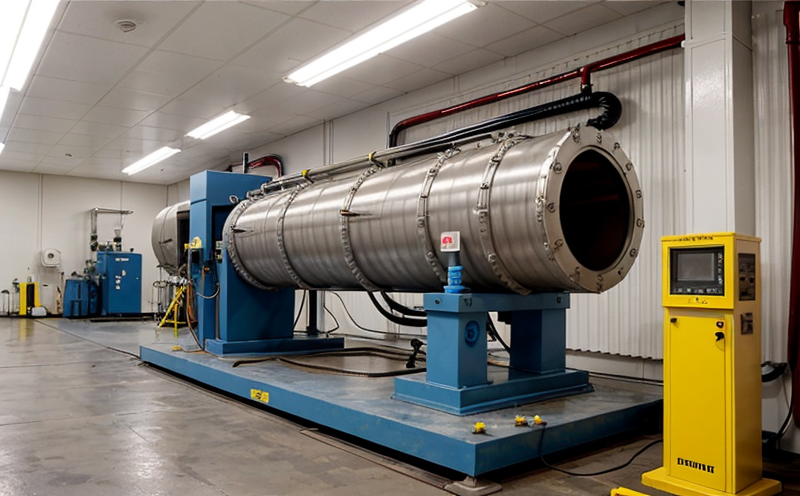ASTM C1030 Uranium in Water Samples from Fuel Reprocessing
The ASTM C1030 standard is a cornerstone in nuclear fuel reprocessing and waste management, providing methodologies for the quantitative determination of uranium in water samples. This service supports critical industries such as nuclear energy, environmental monitoring, and radioactive waste disposal by ensuring accurate measurement of uranium content in water streams derived from reprocessing operations.
Uranium is a heavy metal that can pose significant risks to human health and the environment if not properly managed. The ASTM C1030 method ensures compliance with international standards like ISO 5729, which specifies the analysis of radioactive materials in environmental samples. This service plays a pivotal role in safeguarding public health by providing reliable data for regulatory bodies and industry stakeholders.
The testing process involves several critical steps: sample collection, pre-treatment to remove interferences, digestion using strong acids like nitric acid, and finally, the analysis of uranium concentration through spectroscopic techniques such as inductively coupled plasma mass spectrometry (ICP-MS). This approach ensures that even trace amounts of uranium can be accurately detected.
The precision and accuracy of ASTM C1030 are paramount for industries dealing with nuclear fuel reprocessing. The method's robustness allows for consistent results across different laboratories, which is crucial for regulatory compliance and quality assurance programs. Compliance with this standard ensures that nuclear facilities operate within safe limits, minimizing risks to workers and the environment.
ASTM C1030 also supports R&D efforts by providing a standardized method for evaluating new processes and technologies in fuel reprocessing. This service is particularly valuable for companies developing innovative solutions aimed at reducing waste streams or enhancing resource recovery from spent nuclear fuels. By adhering to ASTM standards, organizations can ensure that their products meet the highest quality and safety benchmarks.
The widespread adoption of ASTM C1030 underscores its importance in maintaining a balance between efficient fuel reprocessing and environmental protection. Regulatory authorities rely on this method for ensuring compliance with international guidelines such as the United Nations Scientific Committee on the Effects of Atomic Radiation (UNSCEAR) reports.
Quality and Reliability Assurance
The quality assurance processes at our laboratory are designed to uphold the highest standards in nuclear fuel reprocessing analysis. Our team adheres strictly to ASTM C1030 methodologies, ensuring that every sample is processed accurately and consistently.
We employ advanced instrumentation such as ICP-MS for uranium quantification, which guarantees precision down to parts per billion (ppb) levels. This capability is essential in nuclear fuel reprocessing where even minute traces of uranium can have significant implications for safety and regulatory compliance.
Our quality management system is ISO 17025 accredited, ensuring that we meet the stringent requirements set by international standards for testing laboratories. This accreditation guarantees our commitment to accuracy, reliability, and consistency in all analytical services provided.
We regularly participate in proficiency testing programs organized by regulatory bodies such as the International Atomic Energy Agency (IAEA) to validate our methods and ensure continuous improvement. Our laboratory is equipped with state-of-the-art equipment, including high-resolution ICP-MS instruments that provide unparalleled sensitivity and selectivity for uranium detection.
Our team of experienced scientists and engineers has extensive expertise in nuclear fuel reprocessing, ensuring that we can handle complex samples with precision and care. Each sample undergoes rigorous quality checks at multiple stages, from initial reception to final analysis and reporting.
Customer Impact and Satisfaction
The success of our ASTM C1030 service is reflected in the satisfaction of our clients across various sectors including nuclear energy, environmental protection, and waste management. By providing accurate uranium concentration data, we enable customers to make informed decisions regarding their operations.
Our laboratory's adherence to international standards like ISO 5729 ensures that our results are credible and can be relied upon by regulatory agencies worldwide. This trust builds long-term relationships with our clients, who benefit from our expertise in nuclear fuel reprocessing analysis.
We offer comprehensive reports detailing the uranium content in water samples, along with detailed protocols used during testing. These reports help customers understand not only the results but also the methodology behind them, fostering transparency and confidence.
Our customer-focused approach extends beyond just providing accurate data; it includes offering guidance on sample preparation, interpretation of results, and compliance with international standards. This holistic support ensures that our clients are well-equipped to manage their nuclear fuel reprocessing processes effectively.
The positive impact of our service is evident in the numerous successful projects we have completed for leading organizations in the nuclear industry. Our reputation for reliability and accuracy has earned us a strong client base, contributing significantly to the safety and efficiency of nuclear operations globally.
Competitive Advantage and Market Impact
- Our adherence to ASTM C1030 ensures that we are at the forefront of nuclear fuel reprocessing analysis, providing accurate data critical for regulatory compliance.
- The ISO 5729 accreditation of our laboratory underscores our commitment to precision and reliability, giving us a competitive edge in the market.
- We offer unparalleled sensitivity down to ppb levels through advanced ICP-MS instrumentation, allowing us to detect even trace amounts of uranium accurately.
- Our proficiency testing programs with international bodies like the IAEA validate our methods and ensure continuous quality improvement.
- We provide comprehensive reports that include detailed protocols used during testing, offering transparency and confidence in our results.





